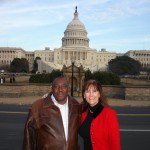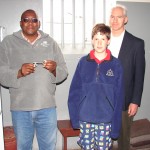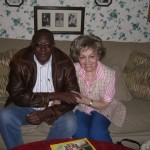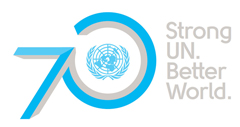The death of Nelson Mandela was a loss to the world. It was such an honor to have met him on a visit to South Africa in 2001 with Wheelchair Foundation and follow up on his request to help “feed his people in the Eastern 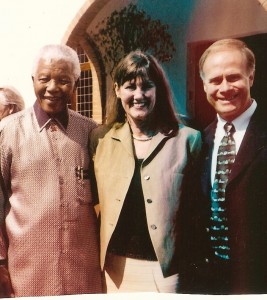 Cape, where we started a sustainable agriculture program. As part of his legacy may we help build a world of tolerance, where man’s inhumanity to man is little known.
Cape, where we started a sustainable agriculture program. As part of his legacy may we help build a world of tolerance, where man’s inhumanity to man is little known.
On a follow up visit, our AAI team received a tour of Robben Island, by Thulani Mbaso, outside Table Bay at Cape Town, South Africa. Thulani shared how prisoners were forced to work long hours in a lime quarry. In the brilliant sun, its white walls glare with painful brightness. Mandela, Thulani and the other prisoners worked long hours and were not allowed dark glasses. The fine lime dust from their back-breaking work pervaded their clothes, invaded their lungs, and irritated their squinting eyes. Some of them, like Mandela, were educated men who knew that even as their bodies labored and suffered, their minds were free and strong. But many other prisoners were uneducated — even illiterate. So the quarry became a place of teaching and learning.
Writing in the dust with sticks, the educated prisoners brought a reverence for the power of knowledge to those who had never had the opportunity to develop their minds. Even prisoners who were criminals, rather than political prisoners, came to understand that grinding poverty, discrimination, ignorance, and lack of opportunity — the wellsprings of crime — were best addressed by empowering their own minds. Some of them became students, too.
This happened before the watchful eyes of prison guards, many of whom were uneducated themselves, but as they watched, many also became students, and Mandela and the others taught them out of respect for their humanity and their interest in learning. Those guards experienced affirmations both of mind and of heart — in sharing their knowledge, the educated prisoners displayed a generosity of spirit that prompted both admiration and growing respect from the guards.
As Thulani was a Member of the African National Congress (ANC), the primary political party in South Africa, he was on the U.S. terrorist watch list. In 2008, AAI’s volunteer for governmental affairs requested from Senator Chris Dodd to get Thulani a special visa before he could enter the US. Remember that Nelson Mandela made a triumphal visit to the United States in June 1990, after his release from twenty-seven years’ imprisonment in South Africa. It was his last visit to the US.
Mandela, fondly called Mandiba by whites, blacks and immigrants alike in South African, openly said that he owed his actual release to General Bantu Holomisa, who retained control of the Transkei Army during his many years of internment. Mandela told our team that there would have been a civil war among the South African Army if Bantu had not been in charge of the larger Transkei divisions. It was largely this Army who influenced his release through negotiations with the civilian government. To this day, South Africans simply refer to Bantu as “The General”.




